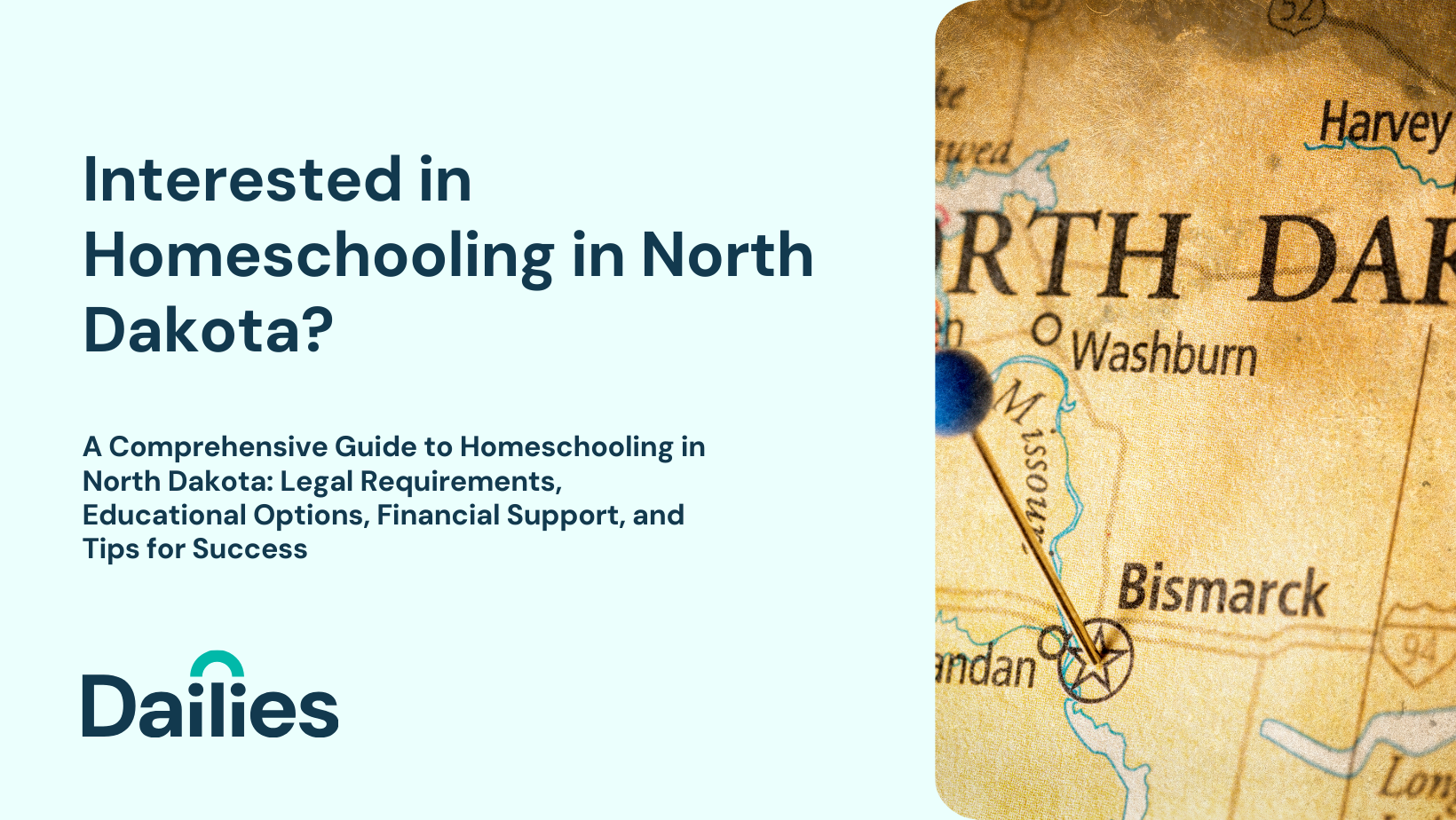Written by
Somer Neziri Read all posts by this author
A Guide to Homeschooling in North Dakota
North Dakota has a thriving homeschool community. The state has taken the time to carve out laws to cater to the families and communities looking at alternatives to traditional schooling. The state is VERY supportive of homeschooling and supporting homeschooling families. Below, you will find an abbreviated fact sheet of North Dakota’s homeschool requirements and information. Please feel free to find additional details directly through North Dakota’s Department of Information’s official site.
General Information
Q: What is the definition of home education?
A: A program of education supervised by a child’s parent.
- “Parent” means a child’s legal guardian
- “Supervise” means the selection of materials, determination of an educational philosophy, and oversight of the method, manner, and delivery of instruction.
Q: Can a parent start a home education program at any time; before or during a school term?
A: Yes; however, there is a waiting period after the Statement of Intent Form (SFN 16909) is submitted to the school superintendent. A parent must wait 5 days from the time the Statement of Intent is submitted before beginning home education.
Statement of Intent
- Filing a Statement of Intent: Parents must submit an annual statement of intent to homeschool to the local school district superintendent. This must be done at least 14 days before starting homeschooling or within 14 days of moving into a new district. The statement should include the child’s name, address, date of birth, grade level, the supervising parent’s qualifications, and details of any public school courses or extracurricular activities the child will participate in. A copy of the child’s immunization record and proof of identity must also be included.
https://www.nd.gov/dpi/sites/www/files/documents/SAO/Home%20Education/SFN16909.pdf
Parent Qualifications and Responsibilities
Q: What qualification does the parent need to have to supervise a child in home education?
A: A parent is qualified to supervise a program of home education if the parent holds a high school diploma or general education diploma (GED). A parent who does not hold a GED or high school diploma can still supervise their child’s home education, but would require monitoring from their school district.
Q: What are the responsibilities of the parent when providing home education?
A: It is the responsibility of the parent to:
- File a Statement of Intent annually with the local superintendent for each student who is to receive home education.
- Supervise the courses required by statute, as well as methods of instruction.
- Conduct classes for the required length of time and number of days.
- Maintain a student academic record for each student receiving home education.
- Arrange for testing using a nationally-normed standardized testing instrument required by statute.
- Serve on a multidisciplinary assessment team for the purpose of evaluating the student who scores below the thirtieth percentile (30%) on the nationally-normed standardized achievement test.
- Transfer the student record, upon request of the local superintendent, if the student enrolls in a public or nonpublic school.
Academic Records
Q: What are the parental requirements for maintaining academic records?
A: A parent supervising home education shall maintain an annual record of courses taken by the child and the child’s academic progress assessments, including any standardized achievement test results.
Monitoring
Q: When does state law require that a monitor is provided for home education?
A: Monitoring is required if the parent has less than a high school diploma or GED. Additionally, monitoring is required if a child scores below the fiftieth (50% percentile on the nationally normed standardized assessment.
Assessments
Q: What are the mandated testing grades for home educated students?
A: North Dakota Century Code states, “While in grades four, six, eight, and ten, each child receiving home education shall take a standardized achievement test used by the school district in which the child resides.” If the parent does not wish to have their child take the district’s standardized achievement test, they will be required to take a nationally normed standardized achievement test of their choice and submit the test scores, including the composite score, to the superintendent or county superintendent if the district does not employ a superintendent.
Q: What are the mandated testing grades for home educated students?
A: North Dakota Century Code states, “While in grades four, six, eight, and ten, each child receiving home education shall take a standardized achievement test used by the school district in which the child resides.” If the parent does not wish to have their child take the district’s standardized achievement test, they will be required to take a nationally normed standardized achievement test of their choice and submit the test scores, including the composite score, to the superintendent or county superintendent if the district does not employ a superintendent.
Q: Can a parent opt-out of the state mandated testing?
A: Yes. A parent can choose to opt-out their child from the state mandated testing requirement if they have “a philosophical, moral or religious objection to the use of standardized achievement tests or the parent: is licensed to teach by NDESPB, holds a baccalaureate degree, or has met or exceeded the cutoff score of a national teacher examination given in this state or any other state if this state does not offer such an examinations.”
Parents who choose to opt-out of state testing shall file the notification and necessary documentation required with the school district at the same time a parent files the statement of intent.
Q: Who is responsible to pay for test materials for home educated students in the required testing grades?
A: If a child receiving home education takes the standardized achievement test used by the school district in which the child resides, the school district is responsible for the cost of the test and for the cost of administering the test. However, if the child takes a nationally normed standardized achievement test not used by the school district in which the child resides, the child’s parent is responsible for the cost of the test.
District Responsibilities
Q: What are the responsibilities of the local school district with regard to home education?
A: After receiving the Statement of Intent to Home Educate (SFN 16909), the local superintendent will:
- Inform the parent about parental responsibility to maintain the student’s academic record for each home-educated student.
- Explain resources and support for students who are experiencing learning difficulties and who may need special education and related services, as well as the responsibility of the local school district to identify and appropriately serve such students.
- Provide the local school district’s expectations for each student at the appropriate grade level in the subjects required by statute.
- Provide information regarding the standardized achievement test administered by the district and the parent’s options regarding the test.
- Provide a copy of the state law on home education.
Q: Does the school district receive state aid payments for home education students if they are taking a course or courses at the school?
A: Yes, the school district is entitled to proportionate state payment. The total amount may not exceed the equivalent of one full state aid payment.
Extracurricular
Q: Can a home-educated student take part in extracurricular activities?
A: Yes. A child receiving home education may participate in extracurricular activities either:
- Under the auspices of the child’s school district of residence; or
- Under the auspices of an approved nonpublic school, if permitted by the administration of the school.
* The child participating under the auspices of the child’s school district of residence is subject to the same standards for participation in extra-curricular activities as those required of full-time students enrolled in the school. The child is subject to the transfer rules as provided in the constitution and by-laws of the North Dakota High School Activities Association
Financial Aid
Tax credit:
The North Dakota House passed a bill on a tax credit for homeschooling.
North Dakota Academic/CTE Scholarship
Q: Is a home-educated student eligible to apply for the Academic/CTE Scholarship?
A: Yes. The window for applications to be submitted is January through the first Friday in June. Home-educated students must file with the NDDPI the Home Education Transcript for the North Dakota Scholarship Program form. The form must be notarized and submitted with the supporting documentation requested in the form.
(Home Education Frequently Asked Questions, n.d.)
Helpful Resources / Communities
North Dakota Homeschool Association
HOW TO HOMESCHOOL IN NORTH DAKOTA 101
https://ndhsa.org/homeschool-101
Resources
Home Education Frequently Asked Questions. (n.d.). North Dakota Department of Public Instruction. https://www.nd.gov/dpi/familiescommunity/families/home-education/home-education-frequently-asked-questions

